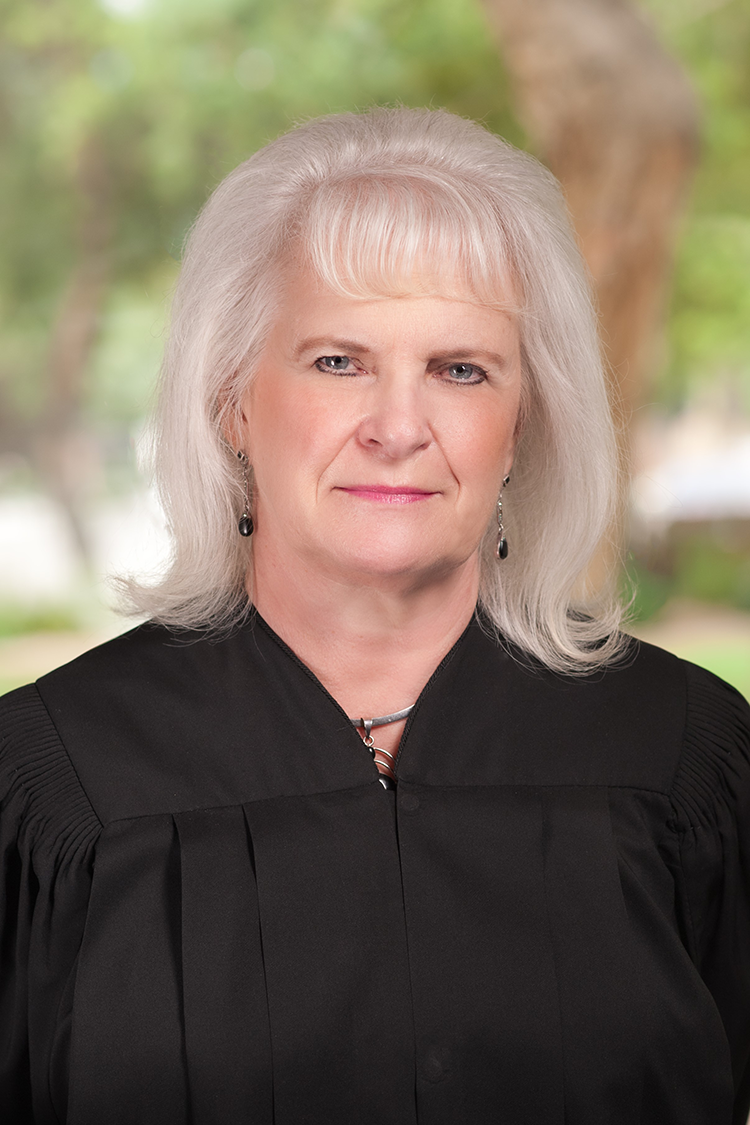Judge's advocacy for domestic violence survivors changed Arizona laws

Elizabeth "Ellie" Finn served as a judge for 42 years before her retirement in 2021. (Photo from the City of Glendale)
Judge Elizabeth “Ellie” Finn likes telling a story about a 5-year-old white girl who went downtown to have lunch with her father and his colleague, “a man who happened to be Black,” she says.
The restaurant owner didn’t want to serve the group, but the little girl’s father insisted. But as they finished each course, the waitstaff took their plates and smashed them on the floors.
“The little girl goes, ‘I don’t understand why they did that,’” says Finn. “And the father says, ‘I don’t either.’”
The little girl in the story was Finn herself, and the father was her dad, Herbert Finn, a civil rights lawyer who spent his career battling to desegregate Arizona schools and fight discrimination in employment, she explains.
After that lunch, Finn understood her responsibility to make the world a fairer place. While still in grade school, she decided she would become a lawyer. Ultimately, she became a judge, and before her 2021 retirement, she served in courts in Arizona for more 42 years. Her early passion for civil rights inspired her to work on domestic violence, mental illness and homelessness issues throughout her career.
Family business
Finn is part of a long line of lawyers. Her mother, Ruth Finn, was one of the first women admitted to Arizona State University Law, graduating at age 50 in 1970. Her sister, Alice Finn Gartell, was general counsel for the Arizona Education Association. And her son, Jesse Finn Turner, is a Maricopa County public defender. All attended Arizona State University Law School, now known as the Arizona State University Sandra Day O’Connor College of Law.
At age 13, Finn had worked various jobs at her father’s firm. When she graduated from ASU Law in 1972, she vowed she wouldn’t go back to his private practice. She was aiming to work in legal aid. But her dad needed someone to represent the garbage workers’ union, and he offered that she could take any case that walked in the door. She stayed seven years.
In 1979, her husband, Edward Turner, told her that he wanted to move to California as she was lying in bed reading a newspaper ad for a presiding judge.
She made him a deal. “Let me try for this judgeship. If I don’t get it, we’ll move to California,’” she says. She interviewed and instead was appointed to the Phoenix Municipal Court. “We didn’t move,” she says.

“When I first became a judge, law enforcement and judges basically had the same attitude for domestic violence,” she says. “They were quote unquote ‘family disputes,’ and we just wanted them to go away. We didn’t pay much attention to what the survivors were saying. And they weren’t called survivors—we didn’t even call them victims.”
But at a conference in the early 1990s, everything changed when she met Sarah Buel, a domestic violence survivor and attorney who would later join the staff at ASU Law.
“She’s just an amazing person with so many creative ideas that just really got us excited,” Finn says.
First, Finn brought Buel to Arizona for court-sponsored domestic violence conferences for judges statewide. Next, Finn convinced the state court to form a standing committee on the impact of domestic violence on the court. Finn served as chair for six years.
She was involved in writing many of Arizona’s domestic violence laws, and as that legislation started passing, she realized there wasn’t a benchbook for domestic violence. So the standing committee she chaired wrote one, which was adopted by the Arizona Supreme Court in 1996.
“It helped solidify things,” she says. “We always had police departments that wouldn’t quite get on board and prosecutors who wouldn’t get on board and judges who wouldn’t. But eventually they did.”
In October 2002, she moved to the Glendale City Court, about 10 miles outside of Phoenix, where she’d serve as presiding judge for more than 18 years.
“I knew immediately that she just was a fair and compassionate person,” says Kathy Williams, Glendale’s court operations supervisor under Finn, now retired. “All that ‘robe-itis’ you hear about—we never saw anything like that from her. “
‘Make them a person’
In Glendale, the process for handling cases people with serious mental illness was lengthy, ringing up high costs as the defendants waited in custody for as long as 12 weeks for costly competency evaluations.
So in 2013, Finn started a mental health court “and just figured it out,” she says. “Initially, it was because of money, but obviously, it turned into passion.”
The Glendale Mental Health Court works with people accused of misdemeanor offenses as “a treatment court intended to assist individuals with mental illness and/or developmental disabilities in the resolution of their criminal case through a cooperative effort among judges, prosecutors, defense attorneys, members of the Veterans Health Administration, the Department of Veterans Affairs Justice Outreach program, human service agencies and Mercy Maricopa Integrated Care, working together,” according to the website.
At the time, the Arizona Superior Court handled competency hearings, forcing cases to move out of municipal jurisdictions, creating paperwork and delays. Finn navigated the system so she could keep those cases within the city court’s jurisdiction and directly hire doctors to come to Glendale courthouses and jails to conduct psychiatric exams.
“We’re able to get people connected with mental health providers when that’s really what they needed all along,” says Jennifer Dalton, a public defender who worked in Finn’s court. “It’s tremendous. Our time frames were bettered at least by 50%, if not more.”
Handling these cases put Finn’s humanity on display. “She takes a defendant and makes them a person,” Dalton says. “That difference has bettered Glendale.”
The compassion extended beyond the courtroom. “You work with your team to figure out what is needed for this person to set up their apartment, like towels and dishes,” Finn says. “Maybe they were on the street for a while and really had nothing.”
Dalton calls Finn “a powerhouse. She’s always very even keeled and sensible no matter what kind of obstacle is thrown her way,” adds Dalton. “It’s nothing to get upset or worried about.”
Finn’s dedication to domestic violence also continued. In 2019, Finn, a self-described “tech geek,” spearheaded Arizona’s new system for protective orders called AZPoint, an online system for requesting protective orders.
She says her motivation isn’t because she knows anyone personally who has experienced domestic violence. “It was just something where I saw a need and felt like I could do something to help.”
ABA service
A member of the American Bar Association since 2005, Finn is the past chair of the National Conference of Specialized Court Judges. She also has served on the House of Delegates.
Recently, Finn has stepped back from ABA activities as she fights ovarian cancer, diagnosed just days after returning from the 2022 ABA Annual Meeting in Chicago. Finn and her husband, a retired supervisor from adult probation, live in Phoenix near their son and their daughter, Sarah Turner, who works for Puma Group.
In 2021, the family honored their history by establishing a scholarship fund named after Ruth Finn for female students at ASU Law who “contribute to the Finn family legacy of public service.”
“Ellie is kind and compassionate and brilliant and well-respected, and her accomplishments are endless,” Williams says. “She’s just a beast, the kindest kind.”
Standing by when seeing injustice isn’t an option, Finns says.
“We have to get involved,” she adds. “We’ve got the law, and the law says we must get involved.”
Members Who Inspire is an ABA Journal series profiling exceptional ABA members. If you know members who do unique and important work, you can nominate them for this series by emailing [email protected].



